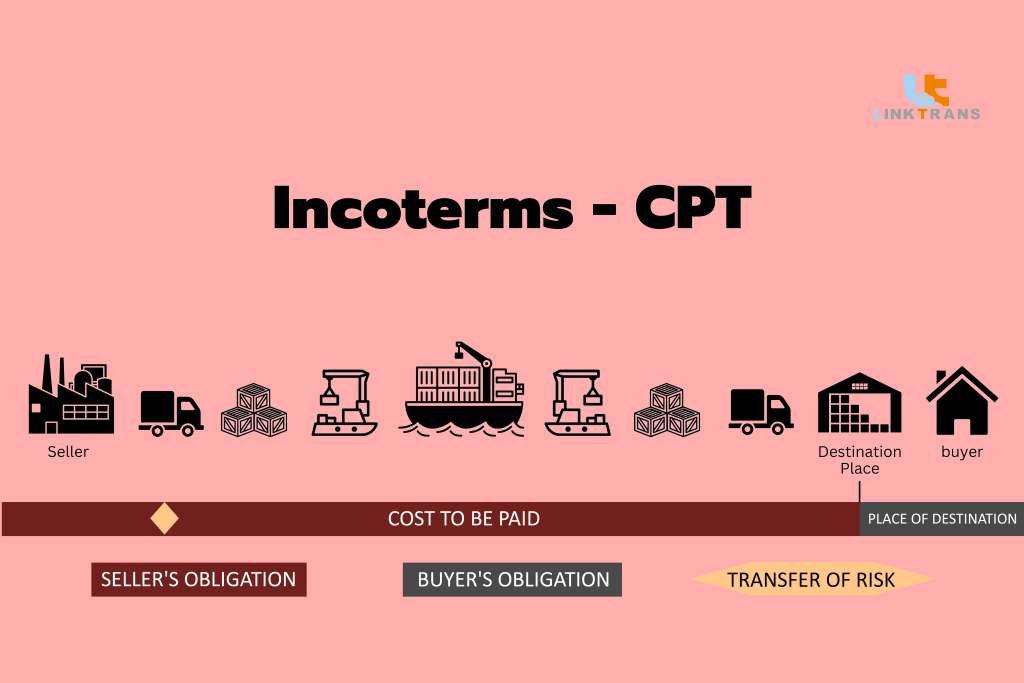
What is Incoterms CPT
Incoterms CPT (Carriage Paid To) is one of the 11 international trade terms defined by the International Chamber of Commerce (ICC). It stands for "Carriage Paid To," and it indicates that the seller is responsible for paying for the transportation of goods to a specified destination. However, the seller's responsibility ends once the goods are delivered to the carrier or another person nominated by the seller.
Responsibilities and Considerations
Seller's Responsibilities
Transportation Costs: The seller is responsible for paying the cost of transporting the goods to the agreed destination, including freight charges, up until the goods are handed over to the carrier.
Export Customs and Duties: The seller must handle export customs procedures and pay any export duties or taxes required in their country.
Delivery to Carrier: The seller must deliver the goods to the carrier or another party nominated by them (e.g., freight forwarder) at a designated place, which is typically a port, terminal, or warehouse.
Risk Until Delivery to Carrier: The seller assumes the risk for any loss or damage to the goods until they are delivered to the carrier.
Buyer's Responsibilities
Import Customs and Duties: The buyer is responsible for paying import duties, taxes, and handling customs clearance when the goods arrive in the destination country.
Risk After Delivery to Carrier: Once the goods are handed over to the carrier, the risk of loss or damage shifts to the buyer, even if the goods are in transit.
Final Delivery: The buyer is responsible for any costs associated with delivering the goods from the arrival point (e.g., port or airport) to the final destination (e.g., buyer’s warehouse).
Insurance: If desired, the buyer may arrange for insurance coverage after the goods are handed over to the carrier.
Key Takeaway
Seller: Pays for transportation and export costs, and bears the risk until goods are delivered to the carrier.
Buyer: Takes on risk once goods are with the carrier and handles import duties, taxes, and final delivery.
This division of responsibilities helps both parties understand their roles in the transaction, ensuring smooth international trade operations under CPT terms.
CPT Incoterm Example
If a seller in the U.S. agrees to sell goods to a buyer in China under CPT terms, the seller would be responsible for transporting the goods from the U.S. to the nominated carrier in the U.S., who will then ship the goods to China. Once the goods are handed over to the carrier in the U.S., the risk of loss or damage during transit would shift to the buyer in China.
In conclusion, CPT is an Incoterm that balances the transportation costs between the buyer and seller, with the seller assuming responsibility for transport costs and the buyer taking on the risk after the goods are handed to the carrier.
You might want to know
What's the difference between CPT and DAP Incoterms?
CPT is almost identical to DAP(incoterm dictates that the seller pays for all costs to get goods from their origin all the way through to the destination terminal), in that the seller pays to get the goods to the destination of the buyer’s choosing.
However, unlike DAP, under the CPT Incoterm, risk transfers to the buyer as soon as the goods are under control of the carrier at the origin. So, for example, if the goods somehow get lost or damaged while onboard an ocean vessel, the seller is not responsible. If the buyer wishes to cover the goods for loss or damage, the buyer is responsible for that cost, as well as the cost for customs import fees and taxes.
What's the difference between CIP vs CPT incoterms?
The main difference between CIP and CPT is the inclusion of insurance under CIP, which the seller is responsible for providing, whereas CPT does not include insurance.
What's the difference between EXW vs CPT incoterms?
Under CIP, the seller takes on more responsibilities, including transportation and insurance, until the goods reach a specified point.
Under EXW, the seller's obligations are limited to making the goods available; the buyer handles all aspects of transportation and risk from the seller's location onward.
Find a reliable logistics provider and Contact us for a customized quote.








